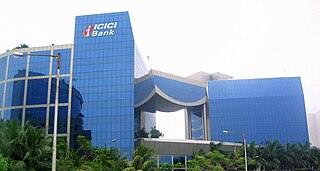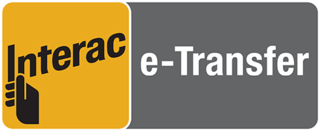A commercial bank is a financial institution which accepts deposits from the public and gives loans for the purposes of consumption and investment to make profit.
A transaction account, also called a checking account, chequing account, current account, demand deposit account, or share draft account at credit unions, is a deposit account held at a bank or other financial institution. It is available to the account owner "on demand" and is available for frequent and immediate access by the account owner or to others as the account owner may direct. Access may be in a variety of ways, such as cash withdrawals, use of debit cards, cheques (checks) and electronic transfer. In economic terms, the funds held in a transaction account are regarded as liquid funds. In accounting terms, they are considered as cash.
Online banking, also known as internet banking, web banking or home banking, is an electronic payment system that enables customers of a bank or other financial institution to conduct a range of financial transactions through the financial institution's website. The online banking system will typically connect to or be part of the core banking system operated by a bank to provide customers access to banking services in place of traditional branch banking. Online banking significantly reduces the banks' operating cost by reducing reliance on a branch network, and offers greater convenience to customers in time saving in coming to a branch and the convenience of being able to perform banking transactions even when branches are closed. Internet banking provides personal and corporate banking services offering features such as viewing account balances, obtaining statements, checking recent transactions, transferring money between accounts, and making payments.

ICICI Bank Limited is an Indian multinational bank and financial services company headquartered in the city of Vadodara, India.
Manulife Bank of Canada is a wholly owned subsidiary of Manulife. As a direct bank, it offers high-interest chequing & savings accounts, credit cards, lines of credit and mortgages, including Manulife One. Since it was established in 1993, Manulife Bank has grown to more than $22 billion in assets and serves customers across Canada. Manulife Bank headquarters are in Waterloo, Ontario.
CS Alterna Bank, operating as Alterna Bank, is a Canadian direct bank and a wholly owned subsidiary of the Ontario-based credit union Alterna Savings. The bank offers chequing and high-interest savings accounts and mortgages.
Cash management refers to a broad area of finance involving the collection, handling, and usage of cash. It involves assessing market liquidity, cash flow, and investments.

Interac e-Transfer is a funds transfer service between personal and business accounts at participating Canadian banks and other financial institutions, offered through Interac Corporation.

A bank statement is an official summary of financial transactions occurring within a given period for each bank account held by a person or business with a financial institution. Such statements are prepared by the financial institution, are numbered and indicate the period covered by the statement, and may contain other relevant information for the account type, such as how much is payable by a certain date. The start date of the statement period is usually the day after the end of the previous statement period.

A branch, banking center or financial center is a retail location where a bank, credit union, or other financial institution offers a wide array of face-to-face and automated services to its customers.
A direct bank is a bank without any branch network that offers its services remotely via online banking and telephone banking or through an independent banking agent network and may also provide access via ATMs, mail and mobile. Direct banks reduce the significant costs of maintaining a branch network.
Core banking is a banking service provided by a group of networked bank branches where customers may access their bank account and perform basic transactions from any of the member branch offices.
Before Uganda's independence in 1962, the main banks in Uganda were Barclays ; Grindlays, Standard Bank and the Bank of Baroda from India. The currency was issued by the East African Currency Board, a London-based body. In 1966, the Bank of Uganda (BoU), which controlled the issue of currency and managed foreign exchange reserves, became the central bank and national banking regulator. The government ownedUganda Commercial Bank and the Uganda Development Bank were launched in the 1960s. The Uganda Development bank was a state-owned development finance institution, which channeled loans from international sources into Ugandan enterprises and administered most of the development loans made to Uganda.
Bank regulation in the United States is highly fragmented compared with other G10 countries, where most countries have only one bank regulator. In the U.S., banking is regulated at both the federal and state level. Depending on the type of charter a banking organization has and on its organizational structure, it may be subject to numerous federal and state banking regulations. Apart from the bank regulatory agencies the U.S. maintains separate securities, commodities, and insurance regulatory agencies at the federal and state level, unlike Japan and the United Kingdom. Bank examiners are generally employed to supervise banks and to ensure compliance with regulations.

A bank is a financial institution that accepts deposits from the public and creates a demand deposit while simultaneously making loans. Lending activities can be directly performed by the bank or indirectly through capital markets.

Wizzit International is a provider of basic banking services for the unbanked and underbanked in South Africa. Its services are based on the use of mobile phones for accessing bank accounts and conducting transactions, in addition to a Maestro debit card that is issued to all customers upon registration. Wizzit is a branchless banking business, meaning that its services are designed so that customers can generally conduct transactions without the need to visit bank branches.
Pride Microfinance Limited (PMFL), is a microfinance deposit-taking institution (MDI) in Uganda. It is licensed by the Bank of Uganda, the central bank and national banking regulator.
Simple was an American neobank based in Portland, Oregon. It is recognized as the first neobank. The company provided FDIC-insured checking accounts to US citizens, but not to Permanent Residents, through a partnership with The Bancorp Bank before transitioning over to BBVA USA in 2016. It was part of the Allpoint network for surcharge-free access to ATMs. Since 2014, Simple was part of Banco Bilbao Vizcaya Argentaria, one of the largest banks in Europe. It was shut down in 2021.
Equitable Bank is a Canadian bank which primarily provides residential and commercial real estate lending services, as well as personal banking through its direct banking brand EQ Bank. The bank was founded in 1970 as The Equitable Trust Company and became a Schedule I Bank offering savings products in 2013. It is now Canada’s ninth largest independent bank, with more than $35 billion in assets under management. As of September 2020, the bank had over $16 billion in deposits. Equitable Bank is a member of the Canada Deposit Insurance Corporation.





